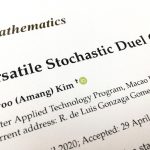 Dr. Song-Kyoo (Amang) Kim, Associate Professor of the Computing Programme of the School of Applied Sciences at MPI
Dr. Song-Kyoo (Amang) Kim, Associate Professor of the Computing Programme of the School of Applied Sciences at MPI
Dr. Song-Kyoo (Amang) Kim’s research article on a stochastic decision-making model, titled “A Versatile Stochastic Duel Game”, was recently published in the renowned international academic journal “Mathematics”. “Mathematics” is ranked in the top 8.6% of JCR mathematics journals, and is indexed in the Science Citation Index Expanded (SCIE) and Scopus with a high impact factor.
This paper deals with a standard stochastic game model with a continuum of states under the duel-type setup. It newly proposes a hybrid model of game theory and the fluctuation process, which could be applied for various practical decision-making situations. The unique theoretical stochastic game model is targeted to analyze a two-person duel-type game in the time domain. This new mathematical model becomes even more practical because the model has been demonstrated to be applied into an actual business competing situation to find the best strategy for a company. An extended version of the duel-type game for multiple players is currently under development.
Dr. Song-Kyoo (Amang) Kim is currently an Associate Professor of the Computing Programme of the School of Applied Sciences at the Macao Polytechnic Institute. He is the author of more than 70 research articles and 10 patents relating to various areas, including applied probability and artificial intelligence. He has been an invited speaker at many international conferences concerning technology management, innovation process, operations research, and data sciences. He is also an External Reviewer of the IEEE Access and IEEE Transactions on Network Science and Engineering.



